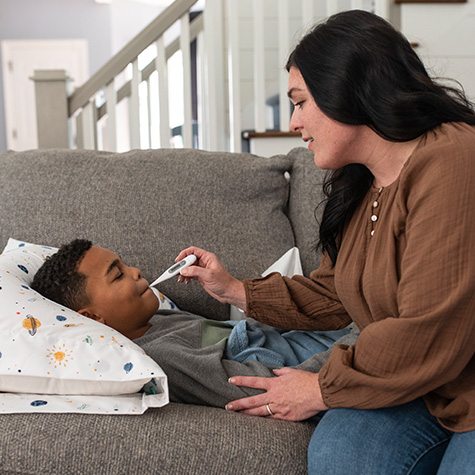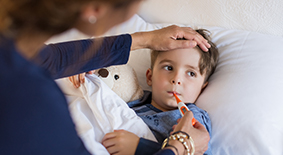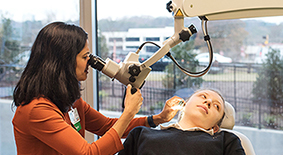Is My Child Too Sick for School?
Reviewed 3/21/2024
“Mom, I don’t feel good.”
When this is how kids start their day, it can throw a kink into the morning routine—not to mention sending parents into a panic. How serious are those sniffles? Is that cough contagious? Is this stomachache a ploy to play hooky, or should your little one stay home and get some rest?
Here’s how to know when it’s time to keep your kid home from school.

Where to go when your child is sick
If your child is sick or injured, it is important to know where to take them for care. Learn what can be treated at a pediatric urgent care center and a pediatrician's office.
Learn More
Why, when and how to wash your kids’ hands
Washing your hands throughout the day, and encouraging your kids to do the same, can help stop the spread of germs and prevent illnesses and infections, like colds, the flu and COVID-19.
learn moreThe best way to prevent the spread of a COVID-19 infection is to avoid exposure to others, especially if your child is showing symptoms of COVID-19.
Keep your child home if he shows the following symptoms:
- Fever that is not responsive to fever-reducing medications
- Sore throat
- Shortness of breath from continued coughing
- New loss of taste or smell
- New onset of severe headache, especially with a fever
- Diarrhea, vomiting or abdominal pain
- Congestion
- Behavior that is not normal for your child
If your child has tested positive for COVID-19, visit the Centers for Disease Control (CDC) website for the most-up-to-date isolation guidance.

“Fevers are often a sign that your child is fighting off a viral or bacterial infection that could get other kids sick,”explained Deirdre Stewart, MD, an area practice director for Children’s Healthcare of Atlanta Urgent Care. “Many schools require children to be fever-free without the use of medicine for at least 24 hours before returning to school.”
Keep your child home if he:
- Has a temperature higher than 100.4°F.
- Is vomiting or has diarrhea.
- Isn’t acting like himself.
- Has other flu-like symptoms, such as chills or body aches.
Call your child's pediatrician immediately if the fever is accompanied by:
- Headache
- Rash
- Stiff neck
“A sore throat is a common symptom of many different types of illness and can be contagious if it is due to strep throat or a virus. Your child should rest at home if persistent sore throat and see a pediatrician to determine if they need treatment with antibiotics for strep throat or recover from the virus with time and rest," warned Dr. Stewart.
Keep your child home if:
- The sore throat is accompanied by fever, headache, chills or a stomachache.
- His throat and tonsils are bright red or have white spots on them.
“Stomachaches and abdominal pain can have many causes, and if your child’s pain or discomfort is persistent or crippling, it’s best to contact his pediatrician,” said Dr. Stewart.
Keep your child home if:
- The pain is accompanied by fever, vomiting, diarrhea or a painful sore throat.
- The stomach pain limits his ability to participate in his regular daily activities.
Dr. Stewart said, “Even though they aren’t always contagious, earaches can be very uncomfortable for a child and may require a trip to the pediatrician.”
Keep your child home if:
- He also has a fever of 100.4°F or higher.
- He acts lethargic, fussy or uncomfortable or in a way that’s not like himself.
- There is discharge coming from the ear.
- He is also experiencing nausea, vomiting and diarrhea.
“Red, itchy eyes are common symptoms of allergies, which shouldn’t keep a child home from school,” advised Dr. Stewart. “These can also be symptoms of pink eye, a contagious infection that requires treatment from a doctor.”
Keep your child home if:
- He also has a fever.
- You see drainage or mucous coming from one or both eyes.
- One or both of his eyes are crusty.
- He is complaining of discomfort in the eye—many kids say it feels like they have sand in their eye.
- One or both eyelids are swollen.
Lice are an unfortunate, but common, problem for many kids. Lice are also contagious and spread through direct contact with other children. Notify your child’s school if you suspect that your child has lice.
“Many schools require that students stay home until all live lice are gone,” said Dr. Stewart. “However, new recommendations from the American Academy of Pediatrics state that students can return to school as soon as they have been treated. Speak directly with your child’s school if you’re unclear on what they recommend.”
Keep your child home if:
- You notice visible signs of live lice, including yellow, tan, brown spots called nits, which can also resemble dandruff and would appear close to the scalp or on strands of hair.
- A fever of 100.4°F or higher is present.
At the end of the day, you know your child best. If he isn’t acting like himself, or it doesn’t seem like he could participate in school activities, trust your instincts and keep your child at home. Often, a quick call to the pediatrician can help put your mind at ease, even if your child doesn’t need to be seen.
Helping Your Kids Stay Healthy and Safe
Deirdre Stewart, MD, is an area practice director for Children’s Healthcare of Atlanta Urgent Care. She has been working in Urgent Care at Children’s since November 1999. Dr. Stewart maintains an undergraduate degree from Emory University, Medical School at Medical College of Georgia, and pediatric residency at Emory. She is board certified in PediAttica and a member of the AAP and Society for Pediatric Urgent Care.
This content is general information and is not specific medical advice. Always consult with a doctor or healthcare provider if you have any questions or concerns about the health of a child. In case of an urgent concern or emergency, call 911 or go to the nearest emergency department right away. Some physicians and affiliated healthcare professionals on the Children’s Healthcare of Atlanta team are independent providers and are not our employees.
Contact Us 404-785-KIDS (5437)




